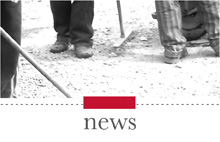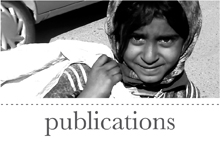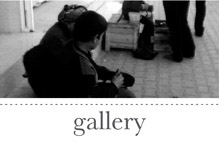Pierre Beaudet is a professor in the program for international development and globalization in the College of Social Sciences at the University of Ottawa. He was founder and director of Alternatives from 1994-2004. He is a consultant for the Canadian International Development Agency, the Center for Research on International Development, and the United Nations Development Program.
* Can be translated as determination or courage
Conquest and Struggle
For a long time, in ancient times, the “country on the two rivers” flourished thanks to the hardworking and generous people who invented agriculture and cities, and later, built empires. Repeatedly victims of invasion, this people preserved its multidimensional identity by linking together several communities. In the twentieth century, however, Iraq was broken up and colonized in an era when the western colonial powers were imposing military control throughout the Middle East. However, they were faced on all sides with fierce resistance. British colonialists even used weapons of mass destruction to kill thousands of Iraqis. Finally, though only briefly, the land of the Arabs and Kurds was forced to submit. Then, history began anew. The resistance of the masses repulsed the European colonialists as well as the newly established American imperialists.
Divide and Rule
Iraq was finally liberated in 1958 by the people and their leader Abd al-Karim Qasim, under the direction of the national forces and the left, fought for liberation, like their Egyptian, Syrian, and Palestinian brothers and sisters. Qasim threw the colonialists out of Iraq and initiated agricultural reform in order to liberate the peasants from the yokes of the landowners that had exploited them. He also negotiated with the Kurdish leadership to establish new mechanisms that would permit each nation in Iraq to live side by side in peace. Confronted by these developments, the imperialists were unwilling to stand aside. Washington wanted to actively maintain control of this region, rich in oil and neighbor to Europe, Asia, and Africa. It ordered the CIA to organize a military coup and to eradicate the resistance. These maneuvers resulted in the occupation of all of Palestine and established the bloody dictatorship of the Shah of Iran, and finally supported Saddam Hussein in Iraq. In sum, the United States succeeded in unleashing violent conflicts between the different peoples in the region, playing Arabs against Kurds, Iranians against Iraqis, and Shiites against Sunnis according to the ancient principle of “divide and rule.”
New Colonialism
Beginning in the 1980s, the revolution in Iran, the Palestinian intifada, and the liberation of certain parts of Iraq by the nationalist and leftist forces changed the balance of power. In Iraq, Saddam was having problems, and the US decided to provide full support for his genocide against the Kurds and for his brutal war against Iran. After the First Gulf War, when his dictatorship was no longer deemed useful, Saddam found himself isolated, and it was the Iraqi people who had to suffer the bitter consequences, the strategy being to keep Saddam in power and to starve the population using sanctions. After September 11, 2001, the American leadership initiated a new strategy aimed at directly controlling Iraq and the Middle East. They wanted to “rebuild” the area with the help of local representatives. President Bush christened it, “The War without End.”
Occupation
The invasion of Iraq in March 2003 was part of a campaign presented as a sort of modern “crusade” to “civilize” the Arabs and Muslim “barbarians.” Within a few days, the US had crushed Saddam’s corrupt regime, but they refused to give control over to the resistance movements, causing the Iraqi people to suffer disastrously. Ten years later, Iraq and the entire region are in chaos. The Palestinian territories are surrounded and faced with the “choice” of a slow death or capitulation. Lebanon, Syria, and Iraq are regularly attacked by the US and their Zionist allies. Iraq’s infrastructure has been destroyed, leaving the people without employment, education, access to healthcare, clean water, electricity, and more importantly, without security. Before the end of Bush’s term, the situation nearly became tragic when American strategists considered using nuclear weapons against Iran. They wanted to dismantle other countries in the region and create mini ‘states’ separated by walls and divided by extreme violence and hatred nurtured by the imperialists.
New Challenges
But at least the worse has been avoided. Indeed, American imperialism and the replacement forces are under a lot of pressure these days. The occupation of Iraq has turned into a nightmare for the occupiers. All the while, the numerous and deadly attacks by the US and Israel have not lowered Palestinian or Lebanese morale. In the US, Bush’s extremist policies have been challenged and have even provoked a massive anti-war movement. Finally, the American people decided to remove the neoconservative militarists from power in the election of 2008. Under Obama’s presidency, American imperialism is trying to reorganize itself. The objective remains the same: total control of the Middle East, the world’s oil reservoirs, and an entryway to three continents. In the long-term, the US is preoccupied with the rising powers (such as Russia, China, and India) and wants to maintain its military superiority in conventional and advanced weapons. Even if Washington talks about withdrawing its troops, in reality, they continue the occupation by creating permanent American military bases and other means of controlling Iraq from a distance.
The Necessity of Democracy
Faced with assault, the people continue to resist, standing tall and proud. On the one hand, it is imperative that they remain united as an Iraqi people and do not divide into three or four or six peoples separated by communitarianism, religion, or ideology. On the other side, vast coalitions are needed to resist occupation and build a democracy. A democratic foundation is indispensable for reestablishing trust and unifying the different communities around a common objective – to build a state and a nation. Naturally, building democracy means rejecting occupation and factionalism. But it also means democratizing society. Social movements, unions, and women’s rights organizations have undertaken this task from the grassroots. Only a democratic Iraq will become free. Obviously this will not be an easy job. The murderous factionalism directed by the occupying forces has created deep divisions within a people once proud and united. But recently, hope has resurfaced. The Iraqis have withstood the tests of confinement and ghetto-ization that the US has used to aggravate ethnic tensions. The majority of Iraqis have said “no” to community factions. They have refused the notion that their country should serve as a base for attacks against Iran or any other nation. Finally, it is more than obvious that the Iraqis refuse to sell their oil, their country’s most precious resource, cheaply or to give it to the war profiteers. Iraq remains standing, even after enduring huge setbacks. Before long, Iraq will become a beacon of the struggle for liberty and democracy












